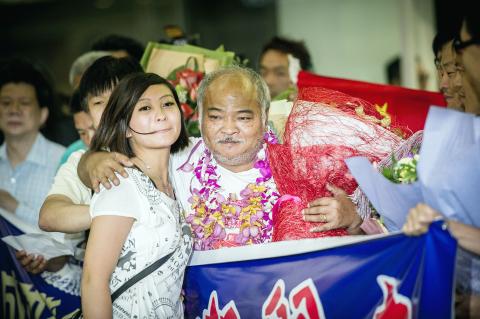|
Officials tout use of
ROC flag
FLAG-WAVER: The deputy minister of foreign
affairs said the use of the Republic of China national flag was in accordance
with Taiwan’s claim over the Diaoyutais
By Shih Hsiu-chuan / Staff reporter

A pro-China activist, right, is
greeted with flowers by well-wishers as he arrives at Hong Kong airport
yesterday following his deportation from Japan.
Photo: AFP
In a statement contrary to its repeated
stance that Taiwan does not team up with China in defense of sovereignty over
the contested Diaoyutai Islands (釣魚台), government officials yesterday recognized
the recent display of the Republic of China (ROC) national flag by pro-China
activists on the islands.
“We thought that the appearance of the ROC national flag on the islands was in
accordance with our sovereignty claims over the Diaoyutai Islands,” Deputy
Minister of Foreign Affairs Tung Kuo-yu (董國猷) said.
Tung said he also conveyed that view to Japanese representative to Taiwan Sumio
Tarui when he called him in on Thursday to express the government’s concerns
over Tokyo’s increasing assertiveness over the Diaoyutai Islands.
Japan yesterday deported 14 pro-China activists from Hong Kong, Macau and China,
who were arrested by Japanese maritime security officers after they landed on
the Diaoyutais, known as the Senkaku Islands in Japan, on Wednesday.
The activists carried with them the ROC national flag, the People’s Republic of
China (PRC) national flag, the flag of the Chinese Nationalist Party (KMT) and
flags representing the Government of the Hong Kong Special Administrative Region
and the Government of Macau Special Administrative Region.
Taiwanese activists did not participate in the action, blaming the government
for stopping fishermen from renting them boats.
Under instructions handed down by President Ma Ying-jeou (馬英九) via meetings
called by National Security Council Secretary-General Hu Wei-chen (胡為真), the
government provided food supplies to the pro-China activists on the Bao Diao II
“for humanitarian reasons” en route to the Diaoyutais.
Immediately after the pro-China activists were arrested, the Ma administration
called for their release “for the sake of maintaining stability of the region.”
In contrast to its statements targeting Japan for being “oblivious” to the
contention over the sovereignty of the islands, the Ma administration yesterday
appeared to further sympathize with the pro-China activists.
As well as Tung’s comments, Premier Sean Chen said, in response to media
queries, that the government looked at any act staged “purely” to assert
Taiwan’s sovereignty over the Diaoyutais “from a positive perspective” as long
as the act “was not tinged with other motives.”
Chen added that the best strategy was to advocate the East China Sea peace
initiative proposed by Ma on Aug. 5, in which he called for all concerned
parties to refrain from antagonistic actions, to shelve disputes on sovereignty
and to cooperate on exploring resources.
The ministry said the initiative has received a positive response from Tokyo.
“We came to a consensus to reduce tension in the region. Sumio Tarui also said
that President Ma’s initiative was well-received in Japan,” Tung said.
Tung said he told Tarui that the government “knew nothing in advance” about the
action taken by the pro-China activists “on their own initiative” and that it
had not been involved.
He also told Tarui that the government maintains the position that Taiwan does
not cooperate with China in its handling of its claim to the islands.
|
![]()
![]()
![]()